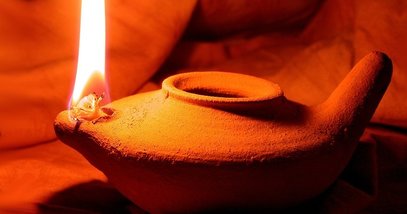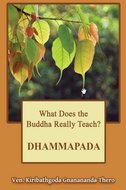 May even my enemies hear talk of the Dhamma. May even my enemies devote themselves to the Buddha's bidding. May even my enemies associate with those people who — peaceful, good -- get others to accept the Dhamma. May even my enemies hear the Dhamma time & again from those who advise endurance, forbearance, who praise non-opposition, and may they follow it. For surely he wouldn't harm me, or anyone else; he would attain the foremost peace, would protect the feeble & firm. Irrigators guide the water. Fletchers shape the arrow shaft. Carpenters shape the wood. The wise control themselves. Read the entire sutta: MN 86: Angulimala Sutta
15. “But, Master Gotama, in what way is there the preservation of truth? How does one preserve truth? We ask Master Gotama about the preservation of truth.” “If a person has faith, Bhāradvāja, he preserves truth when he says: ‘My faith is thus’; but he does not yet come to the definite conclusion: ‘Only this is true, anything else is wrong.’ In this way, Bhāradvāja, there is the preservation of truth; in this way he preserves truth; in this way we describe the preservation of truth. But as yet there is no discovery of truth. “If a person approves of something … if he receives an oral tradition … if he [reaches a conclusion based on] reasoned cogitation … if he gains a reflective acceptance of a view, he preserves truth when he says: ‘My reflective acceptance of a view is thus’; but he does not yet come to the definite conclusion: ‘Only this is true, anything else is wrong.’ In this way too, Bhāradvāja, there is the preservation of truth; in this way he preserves truth; in this way we describe the preservation of truth. But as yet there is no discovery of truth.” 16. “In that way, Master Gotama, there is the preservation of truth; in that way one preserves truth; in that way we recognise the preservation of truth. But in what way, Master Gotama, is there the discovery of truth? In what way does one discover truth? We ask Master Gotama about the discovery of truth.” 17. “Here, Bhāradvāja, a bhikkhu may be living in dependence on some village or town. Then a householder or a householder’s son goes to him and investigates him in regard to three kinds of states: [172] in regard to states based on greed, in regard to states based on hate, and in regard to states based on delusion: ‘Are there in this venerable one any states based on greed such that, with his mind obsessed by those states, while not knowing he might say, “I know,” or while not seeing he might say, “I see,” or he might urge others to act in a way that would lead to their harm and suffering for a long time?’ As he investigates him he comes to know: ‘There are no such states based on greed in this venerable one. The bodily behaviour and the verbal behaviour of this venerable one are not those of one affected by greed. And the Dhamma that this venerable one teaches is profound, hard to see and hard to understand, peaceful and sublime, unattainable by mere reasoning, subtle, to be experienced by the wise. This Dhamma cannot easily be taught by one affected by greed.’ 18. “When he has investigated him and has seen that he is purified from states based on greed, he next investigates him in regard to states based on hate: ‘Are there in this venerable one any states based on hate such that, with his mind obsessed by those states … he might urge others to act in a way that would lead to their harm and suffering for a long time?’ As he investigates him, he comes to know: ‘There are no such states based on hate in this venerable one. The bodily behaviour and the verbal behaviour of this venerable one are not those of one affected by hate. And the Dhamma that this venerable one teaches is profound … to be experienced by the wise. This Dhamma cannot easily be taught by one affected by hate.’ 19. “When he has investigated him and has seen that he is purified from states based on hate, [173] he next investigates him in regard to states based on delusion: ‘Are there in this venerable one any states based on delusion such that, with his mind obsessed by those states … he might urge others to act in a way that would lead to their harm and suffering for a long time?’ As he investigates him, he comes to know: ‘There are no such states based on delusion in this venerable one. The bodily behaviour and the verbal behaviour of this venerable one are not those of one affected by delusion. And the Dhamma that this venerable one teaches is profound … to be experienced by the wise. This Dhamma cannot easily be taught by one affected by delusion.’ 20. “When he has investigated him and has seen that he is purified from states based on delusion, then he places faith in him; filled with faith he visits him and pays respect to him; having paid respect to him, he gives ear; when he gives ear, he hears the Dhamma; having heard the Dhamma, he memorises it and examines the meaning of the teachings he has memorised; when he examines their meaning, he gains a reflective acceptance of those teachings; when he has gained a reflective acceptance of those teachings, zeal springs up; when zeal has sprung up, he applies his will; having applied his will, he scrutinises; having scrutinised, he strives; resolutely striving, he realises with the body the supreme truth and sees it by penetrating it with wisdom. In this way, Bhāradvāja, there is the discovery of truth; in this way one discovers truth; in this way we describe the discovery of truth. But as yet there is no final arrival at truth.” 21. “In that way, Master Gotama, there is the discovery of truth; in that way one discovers truth; in that way we recognise the discovery of truth. But in what way, Master Gotama, is there the final arrival at truth? In what way does one finally arrive at truth? We ask Master Gotama about the final arrival at truth.” [174] “The final arrival at truth, Bhāradvāja, lies in the repetition, development, and cultivation of those same things. In this way, Bhāradvāja, there is the final arrival at truth; in this way one finally arrives at truth; in this way we describe the final arrival at truth.” 22. “In that way, Master Gotama, there is the final arrival at truth; in that way one finally arrives at truth; in that way we recognise the final arrival at truth. But what, Master Gotama, is most helpful for the final arrival at truth? We ask Master Gotama about the thing most helpful for the final arrival at truth.” Read the whole sutta on the Wisdom Publications website. © Bhikkhu Bodhi, The Middle Length Discourses of the Buddha (Wisdom Publications, 2009) This selection from The Middle Length Discourses of the Buddha by Bhikkhu Bodhi is licensed under a Creative Commons Attribution-NonCommercial-NoDerivs 3.0 Unported License. Based on a work at http://www.wisdompubs.org/book/middle-length-discourses-buddha.  From the Numerical Discourses of th eBuddha, AN 5:162 Then Ven. Sariputta addressed the monks: "Friend monks." "Yes, friend," the monks responded to him. Ven. Sariputta said: "There are these five ways of subduing hatred by which, when hatred arises in a monk, he should wipe it out completely. Which five? "There is the case where some people are impure in their bodily behavior but pure in their verbal behavior. Hatred for a person of this sort should be subdued. "There is the case where some people are impure in their verbal behavior but pure in their bodily behavior. Hatred for a person of this sort should also be subdued. "There is the case where some people are impure in their bodily behavior & verbal behavior, but who periodically experience mental clarity & calm. Hatred for a person of this sort should also be subdued. "There is the case where some people are impure in their bodily behavior & verbal behavior, and who do not periodically experience mental clarity & calm. Hatred for a person of this sort should also be subdued. "There is the case where some people are pure in their bodily behavior & their verbal behavior, and who periodically experience mental clarity & calm. Hatred for a person of this sort should also be subdued. "Now as for a person who is impure in his bodily behavior but pure in his verbal behavior, how should one subdue hatred for him? Just as when a monk who makes use of things that are thrown away sees a rag in the road: Taking hold of it with his left foot and spreading it out with his right, he would tear off the sound part and go off with it. In the same way, when the individual is impure in his bodily behavior but pure in his verbal behavior, one should at that time pay no attention to the impurity of his bodily behavior, and instead pay attention to the purity of his verbal behavior. Thus the hatred for him should be subdued. "And as for a person who is impure in his verbal behavior, but pure in his bodily behavior, how should one subdue hatred for him? Just as when there is a pool overgrown with slime & water plants, and a person comes along, burning with heat, covered with sweat, exhausted, trembling, & thirsty. He would jump into the pool, part the slime & water plants with both hands, and then, cupping his hands, drink the water and go on his way. In the same way, when the individual is impure in his verbal behavior but pure in his bodily behavior, one should at that time pay no attention to the impurity of his verbal behavior, and instead pay attention to the purity of his bodily behavior. Thus the hatred for him should be subdued. "And as for a person who is impure in his bodily behavior & verbal behavior, but who periodically experiences mental clarity & calm, how should one subdue hatred for him? Just as when there is a little puddle in a cow's footprint, and a person comes along, burning with heat, covered with sweat, exhausted, trembling, & thirsty. The thought would occur to him, 'Here is this little puddle in a cow's footprint. If I tried to drink the water using my hand or cup, I would disturb it, stir it up, & make it unfit to drink. What if I were to get down on all fours and slurp it up like a cow, and then go on my way?' So he would get down on all fours, slurp up the water like a cow, and then go on his way. In the same way, when an individual is impure in his bodily behavior & verbal behavior, but periodically experiences mental clarity & calm, one should at that time pay no attention to the impurity of his bodily behavior...the impurity of his verbal behavior, and instead pay attention to the fact that he periodically experiences mental clarity & calm. Thus the hatred for him should be subdued. "And as for a person who is impure in his bodily behavior & verbal behavior, and who does not periodically experience mental clarity & calm, how should one subdue hatred for him? Just as when there is a sick man — in pain, seriously ill — traveling along a road, far from the next village & far from the last, unable to get the food he needs, unable to get the medicine he needs, unable to get a suitable assistant, unable to get anyone to take him to human habitation. Now suppose another person were to see him coming along the road. He would do what he could out of compassion, pity, & sympathy for the man, thinking, 'O that this man should get the food he needs, the medicine he needs, a suitable assistant, someone to take him to human habitation. Why is that? So that he won't fall into ruin right here.' In the same way, when a person is impure in his bodily behavior & verbal behavior, and who does not periodically experience mental clarity & calm, one should do what one can out of compassion, pity, & sympathy for him, thinking, 'O that this man should abandon wrong bodily conduct and develop right bodily conduct, abandon wrong verbal conduct and develop right verbal conduct, abandon wrong mental conduct and develop right mental conduct. Why is that? So that, on the break-up of the body, after death, he won't fall into the plane of deprivation, the bad destination, the lower realms, purgatory.' Thus the hatred for him should be subdued. "And as for a person who is pure in his bodily behavior & verbal behavior, and who periodically experiences mental clarity & calm, how should one subdue hatred for him? Just as when there is a pool of clear water — sweet, cool, & limpid, with gently sloping banks, & shaded on all sides by trees of many kinds — and a person comes along, burning with heat, covered with sweat, exhausted, trembling, & thirsty. Having plunged into the pool, having bathed & drunk & come back out, he would sit down or lie down right there in the shade of the trees. In the same way, when an individual is pure in his bodily behavior & verbal behavior, and periodically experiences mental clarity & calm, one should at that time pay attention to the purity of his bodily behavior...the purity of his verbal behavior, and to the fact that he periodically experiences mental clarity & calm. Thus the hatred for him should be subdued. An entirely inspiring individual can make the mind grow serene. "These are five ways of subduing hatred by which, when hatred arises in a monk, he should wipe it out completely." ©2004 Thanissaro Bhikkhu. The text of this page ("Aghatavinaya Sutta: Subduing Hatred (2)", by Thanissaro Bhikkhu) is licensed under a Creative Commons Attribution-NonCommercial 4.0 International License. To view a copy of the license, visit http://creativecommons.org/licenses/by-nc/4.0/. Documents linked from this page may be subject to other restrictions. Transcribed from a file provided by the translator. Last revised for Access to Insight on 30 November 2013. How to cite this document (a suggested style): "Aghatavinaya Sutta: Subduing Hatred (2)" (AN 5.162), translated from the Pali by Thanissaro Bhikkhu. Access to Insight (Legacy Edition), 30 November 2013, http://www.accesstoinsight.org/tipitaka/an/an05/an05.162.than.html .  126. Some are born in the womb; the wicked are born in hell; the devout go to heaven; the stainless pass into Nibbana.  The Sutta: I have heard that at one time the Blessed One was staying at Nadika, in the Brick Hall. There he addressed the monks, "Monks, mindfulness of death — when developed & pursued — is of great fruit & great benefit. It gains a footing in the Deathless, has the Deathless as its final end. And how is mindfulness of death developed & pursued so that it is of great fruit & great benefit, gains a footing in the Deathless, and has the Deathless as its final end? "There is the case where a monk, as day departs and night returns, reflects: 'Many are the [possible] causes of my death. A snake might bite me, a scorpion might sting me, a centipede might bite me. That would be how my death would come about. That would be an obstruction for me. Stumbling, I might fall; my food, digested, might trouble me; my bile might be provoked, my phlegm... piercing wind forces [in the body] might be provoked. That would be how my death would come about. That would be an obstruction for me.' Then the monk should investigate: 'Are there any evil, unskillful mental qualities unabandoned by me that would be an obstruction for me were I to die in the night?' If, on reflecting, he realizes that there are evil, unskillful mental qualities unabandoned by him that would be an obstruction for him were he to die in the night, then he should put forth extra desire, effort, diligence, endeavor, undivided mindfulness, & alertness for the abandoning of those very same evil, unskillful qualities. Just as when a person whose turban or head was on fire would put forth extra desire, effort, diligence, endeavor, undivided mindfulness, & alertness to put out the fire on his turban or head, in the same way the monk should put forth extra desire, effort, diligence, endeavor, undivided mindfulness, & alertness for the abandoning of those very same evil, unskillful qualities. But if, on reflecting, he realizes that there are no evil, unskillful mental qualities unabandoned by him that would be an obstruction for him were he to die in the night, then for that very reason he should dwell in joy & rapture, training himself day & night in skillful qualities. "Further, there is the case where a monk, as night departs and day returns, reflects: 'Many are the [possible] causes of my death. A snake might bite me, a scorpion might sting me, a centipede might bite me. That would be how my death would come about. That would be an obstruction for me. Stumbling, I might fall; my food, digested, might trouble me; my bile might be provoked, my phlegm... piercing wind forces [in the body] might be provoked. That would be how my death would come about. That would be an obstruction for me.' Then the monk should investigate: 'Are there any evil, unskillful mental qualities unabandoned by me that would be an obstruction for me were I to die during the day?' If, on reflecting, he realizes that there are evil, unskillful mental qualities unabandoned by him that would be an obstruction for him were he to die during the day, then he should put forth extra desire, effort, diligence, endeavor, undivided mindfulness, & alertness for the abandoning of those very same evil, unskillful qualities. Just as when a person whose turban or head was on fire would put forth extra desire, effort, diligence, endeavor, undivided mindfulness, & alertness to put out the fire on his turban or head, in the same way the monk should put forth extra desire, effort, diligence, endeavor, undivided mindfulness, & alertness for the abandoning of those very same evil, unskillful qualities. But if, on reflecting, he realizes that there are no evil, unskillful mental qualities unabandoned by him that would be an obstruction for him were he to die during the day, then for that very reason he should dwell in joy & rapture, training himself day & night in skillful qualities. "This, monks, is how mindfulness of death is developed & pursued so that it is of great fruit & great benefit, gains a footing in the Deathless, and has the Deathless as its final end." That is what the Blessed One said. Gratified, the monks delighted in the Blessed One's words. ©1997 Thanissaro Bhikkhu. The text of this page ("Maranassati Sutta: Mindfulness of Death (2)", by Thanissaro Bhikkhu) is licensed under a Creative Commons Attribution-NonCommercial 4.0 International License. To view a copy of the license, visit http://creativecommons.org/licenses/by-nc/4.0/. Documents linked from this page may be subject to other restrictions. Transcribed from a file provided by the translator. Last revised for Access to Insight on 30 November 2013.  76. When the wise person sees your faults, he points them out and helps you to improve. It is as if he guides you to a hidden treasure. Associate with such a wise person. As a result, only good will come, not bad. 77. A noble friend advises you, instructs you, and restrains you from doing evil. Such a noble friend is pleasing to grateful people but displeasing to the ungrateful. 78. Do not associate with evil friends. Do not associate with people with evil intentions. Associate with noble friends. Associate with the best of people who are full of wholesome qualities. 79. The wise person tranquilizes his mind through the realization of Dhamma. He lives happily rejoicing in the Dhamma. He always delights in the true Dhamma taught by the noble ones. 80. Irrigators guide water to wherever it is needed. Arrow makers shape arrows to fit to task. Carpenters fashion wood for the desired design. The wise tame themselves in the same way. 81. As a solid mass of rock is not shaken by a storm, so too the wise are not moved by praise or blame. 82. As a deep lake that is clear and still, so too are the wise, having listened to the true Dhamma. 83. Noble people let go of desire for everything. They do not speak deceptively in order to gain pleasures and desires. Touched by happiness or unhappiness, the wise show no elation or depression. 84. The wise person neither commits evil for his own sake nor for the sake of others. He neither desires children, nor wealth, nor kingdom unfaithfully. He does not desire any success by unrighteous means. He is indeed virtuous, wise, and righteous. 85. Few, among humans, cross over the journey of rebirth to the farther shore called Nibbāna. The rest, the majority of people, only run about on this shore. 86. Those who act according to the perfectly taught Dhamma will reach Nibbāna, by crossing the realm of Māra, which is difficult to cross. 87. The wise person abandons unwholesome things and cultivates wholesome things. Then, abandoning household life, that person becomes a monk or a nun and enters the solitude, which is hardly enjoyed by ordinary people. 88. The wise person seeks delight in solitude, abandoning sense pleasures. Heading towards ultimate purification, he cleanses himself of the things that defile the mind. 89. Liberated ones’ minds have reached full maturity in the enlightenment factors. Giving up all grasping, they delight in Nibbāna. Since they have destroyed impurities, they glow with wisdom. They are the ones who attain ultimate freedom in this world. How do we know if the place we are living is suitable? If we're getting enough food and shelter? Or something more important?  From the Sutta... 3. “Here, bhikkhus, a bhikkhu lives in some jungle thicket. While he is living there his unestablished mindfulness does not become established, his unconcentrated mind does not become concentrated, his undestroyed taints do not come to destruction, he does not attain the unattained supreme security from bondage; and also the requisites of life that should be obtained by one gone forth - robes, almsfood, resting place, and medicinal requisites - are hard to come by. The bhikkhu should consider thus: ‘I am living in this jungle thicket. While I am living here my unestablished mindfulness does not become established … I do not attain the unattained supreme security from bondage; and also the requisites of life … are hard to come by.’ That bhikkhu should depart from that jungle thicket that very night or that very day; he should not continue living there. 4. “Here, bhikkhus, a bhikkhu lives in some jungle thicket. While he is living there his unestablished mindfulness does not become established, his unconcentrated mind does not become concentrated, his undestroyed taints do not come to destruction, he does not attain the unattained supreme security from bondage; yet the requisites of life that should be obtained by one gone forth … are easy to come by. The bhikkhu should consider thus: ‘I am living in this jungle thicket. While I am living here my unestablished mindfulness does not become established … I do not attain the unattained supreme security from bondage; yet the requisites of life that should be obtained by one gone forth … are easy to come by. However, I did not go forth from the home life into homelessness for the sake of robes, almsfood, resting place, and medicinal requisites. Moreover, while I am living here my unestablished mindfulness does not become established … I do not attain the unattained supreme security from bondage.’ Having reflected thus, that bhikkhu should depart from that jungle thicket; he should not continue living there. 5. “Here, bhikkhus, a bhikkhu lives in some jungle thicket. While he is living there his unestablished mindfulness becomes established, his unconcentrated mind becomes concentrated, his undestroyed taints come to destruction, he attains the unattained supreme security from bondage; yet the requisites of life that should be obtained by one gone forth … are hard to come by. The bhikkhu should consider thus: ‘I am living in this jungle thicket. While I am living here my unestablished mindfulness has become established … I have attained the unattained supreme security from bondage; yet the requisites of life … are hard to come by. However, I did not go forth from the home life into homelessness for the sake of robes, almsfood, resting place, and medicinal requisites. Moreover, while I am living here my unestablished mindfulness has become established … I have attained the unattained supreme security from bondage.’ Having reflected thus, that bhikkhu should continue living in that jungle thicket; he should not depart. 6. “Here, bhikkhus, a bhikkhu lives in some jungle thicket. While he is living there his unestablished mindfulness becomes established, his unconcentrated mind becomes concentrated, his undestroyed taints come to destruction, he attains the unattained supreme security from bondage; and also the requisites of life that should be obtained by one gone forth - robes, almsfood, resting place, and medicinal requisites - are easy to come by. The bhikkhu should consider thus: ‘I am living in this jungle thicket. While I am living here my unestablished mindfulness has become established … I have attained the unattained supreme security from bondage; and also the requisites of life … are easy to come by.’ That bhikkhu should continue living in that jungle thicket as long as life lasts; he should not depart. ... Read the complete sutta in the Middle Lenght Discourses of the Buddha, published by Wisdom Publications.  From the sutta: "Just as when the oil in a burning oil lamp is inconstant & subject to change, its wick is inconstant & subject to change, its flame is inconstant & subject to change, its light is inconstant & subject to change. If someone were to say, 'The oil in that burning oil lamp is inconstant & subject to change, its wick is inconstant & subject to change, its flame is inconstant & subject to change, but as for its light, that is constant, everlasting, eternal, & not subject to change': would he be speaking rightly?" "No, venerable sir. Why is that? Because the oil in that burning oil lamp is inconstant & subject to change, its wick is inconstant & subject to change, its flame is inconstant & subject to change, so how much more should its light be inconstant & subject to change." Read the entire sutta...  From the Kakacupama Sutta: "Monks, there are these five modes of speech which people might use when speaking to you — speech that is timely or untimely, true or false, gentle or harsh, with a good or a harmful motive, and with a loving heart or hostility. "Monks, some might speak to you using speech that is timely or untimely; monks, some might speak to you according to truth or falsely; monks, some might speak to you gently or harshly; monks, some might speak to you with a good motive or with a harmful motive; monks, some might speak to you with a loving heart or with hostility. On all occasions, monks, you should train yourselves thus: 'Neither shall our minds be affected by this, nor for this matter shall we give vent to evil words, but we shall remain full of concern and pity, with a mind of love, and we shall not give in to hatred. On the contrary, we shall live projecting thoughts of universal love to that very person, making him as well as the whole world the object of our thoughts of universal love — thoughts that have grown great, exalted and measureless. We shall dwell radiating these thoughts which are void of hostility and ill will.' It is in this way, monks, that you should train yourselves. "Suppose, monks, a person were to come to you, holding a hoe and a basket and he were to say: 'I shall make this great earth earthless.' Then he would strew the earth here and there, spit here and there, and urinate here and there, and would say:' 'Be earthless, be earthless.' What do you think, monks, would this person render this great earth earthless?" "No, indeed not, most venerable sir." "And why?" "Because this great earth, most venerable sir, is deep and without measure. It cannot possibly be turned earthless. On the contrary, that person would only reap weariness and frustration." "In the same way, monks, others may use these five modes of speech when speaking to you — speech that is timely or untimely, true or false, gentle or harsh, with a good or a harmful motive, and with a loving heart or hostility. In this way, monks, you should train yourselves: 'Neither shall our minds be affected by this, nor for this matter shall we give vent to evil words, but we shall remain full of concern and pity, with a mind of love, and we shall not give in to hatred. On the contrary, we shall live projecting thoughts of universal love to that very person, making him as well as the whole world the object of our thoughts of universal love — thoughts that have grown great, exalted and measureless. We shall dwell radiating these thoughts which are void of hostility and ill will.' It is in this way, monks, that you should train yourselves.
|

|
LocationMahamevnawa Buddhist Monastery Winnipeg at the Buddha Meditation Center Winnipeg 2610 St Mary’s Road, Winnipeg, MB R2N 4A2 204 869 5272 [email protected] We sometimes take photos of our events and post them on our website. If you would like us to take down any images you appear in across any of our platforms, please let us know and we will be happy to remove them. |
Learning
Quick Links
Our Branches
We gratefully recognize that our monastery rests on the traditional territory of Anishinaabeg, Cree, Oji-Cree, Dakota, and Dene peoples, and the homeland of the Métis Nation.
|



 RSS Feed
RSS Feed

